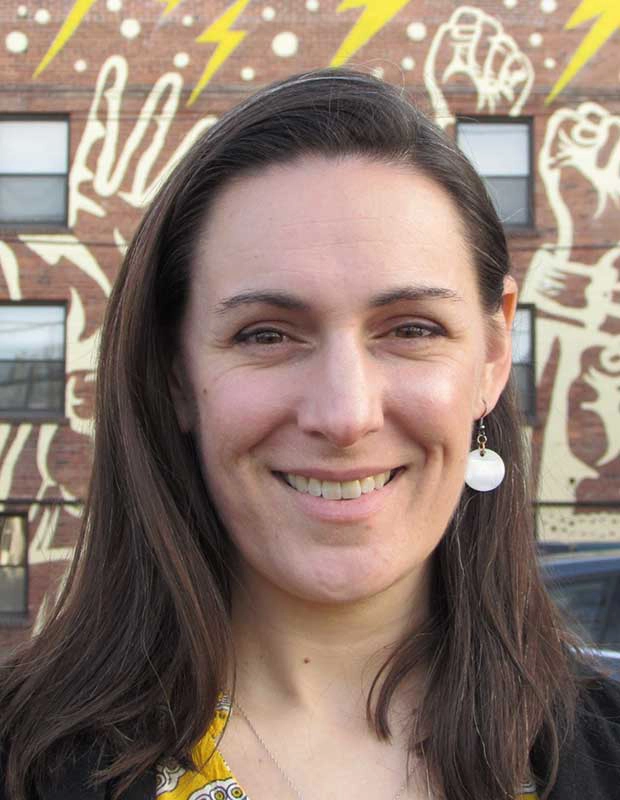CDC participant uses data analysis to support public health evaluation and equity
Meet Kimberly Castelin
Kimberly Castelin, Ph.D., has always had a strong passion for advancing equity and social justice.

Kimberly Castelin, Ph.D., is applying her passion for equity and social justice to advance public health and program evaluation as part of the CDC Research Participation Program.
Growing up, she recognized examples of unfairness in the world and felt inspired to work with others to change them. She drew further inspiration from books on social justice and reformation in college and pushed herself to work in complex spaces. After graduating with her doctoral degree in environmental and natural resource sciences from Washington State University, Castelin began searching for a career where she could apply her passion and skills in a meaningful way.
“I sought opportunities where different value systems meet and I can contribute by gathering evidence to guide decisions that benefit people in real ways,” she said. “I wanted to apply my analytical skills to advance equity and social justice in a new sector.”
When she stumbled across the Centers for Disease Control and Prevention (CDC) Research Participation Program while attending the American Evaluation Association conference in 2019, Castelin immediately knew it offered a great opportunity for growth and development.
The CDC Research Participation Program is an educational and training program designed to provide students, recent graduates, and university faculty opportunities to participate in CDC research and developmental activities to support a wide array of public health programs. Castelin’s appointment took place in the Office of the Director in the Center for Surveillance, Epidemiology and Laboratory Sciences (CSELS). Under the guidance of her mentor, Goldie MacDonald, Associate Director for Evaluation, Castelin contributed to a variety of projects that use qualitative and quantitative data to support action.
In the first year of her fellowship, Castelin collaborated with a multidisciplinary team to support foundational work on the Public Health Data Modernization Initiative (DMI). DMI aims to strengthen public health data and surveillance capabilities and infrastructure nationwide. For this project, Castelin collaborated with program and evaluation personnel to identify and compile data and information resources that local and state departments of health can use to support capabilities and needs assessments. The team developed and released the Data Modernization Initiative Catalog of Data Resources last year and many jurisdictions used the tool right away. In tandem, Castelin also helped design and implement a mixed method evaluation of a web-based training module on evaluation theory that will be used in the future to support professional development among early career evaluators in public health organizations.
Castelin’s most recent project includes collaborative efforts with CDC scientists and others to develop and implement a qualitative assessment of key dimensions of diversity, equity, and inclusion in the workplace. CSELS personnel will use the findings to develop a robust plan to improve these key dimensions for all employees in the Center.
Throughout the course of her appointment, Castelin developed new skills in qualitative and quantitative data analysis and has advanced her applied research and communication abilities.
“My experience has been an incredible learning opportunity that will stay with me in the years ahead,” she said. “I’ve gained a new perspective on the complexity and diversity of work that happens across public health and program evaluation.”
However, according to Castelin, her greatest achievement thus far is overcoming her feeling of imposter syndrome, which refers to the internal experience of doubting your capabilities or believing that you are not as competent as your peers perceive you to be.
“Joining a leading public health agency at a historic moment in time was intense,” she explained. “I learned to quiet my imposter syndrome and instead focus on completing quality work.”
Castelin will continue her career with the CDC as a Health Scientist (Senior Science Fellow) in the Center for State, Tribal, Local, and Territorial Support. She joins a team of professionals who will contribute to a robust evaluation of the National Initiative to Address COVID-19 Health Disparities among Populations at High-Risk and Underserved, Including Racial and Ethnic Minority Populations and Rural Communities. She credits her ORISE experience as providing her support and professional development at a pivotal point in her career, and is grateful for the opportunities her fellowship offered.
“My ORISE fellowship has been a wild ride,” said Castelin. “Being an ORISE participant allowed me to contribute to meaningful projects and gave space for mentorship and growth during a year when we all experienced profound losses and had to cope with enormous, extraordinary stressors.”
The program is managed by the Oak Ridge Institute for Science and Education (ORISE) under an agreement between the Centers for Disease Control and Prevention (CDC) and the U.S. Department of Energy (DOE). ORISE focuses on scientific initiatives including educating the next generation of scientists and is managed for DOE by ORAU.

